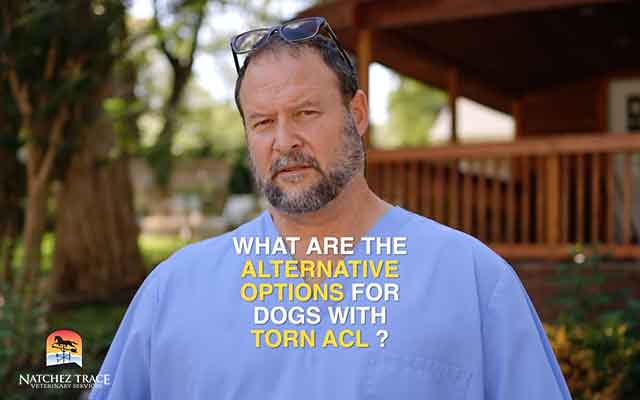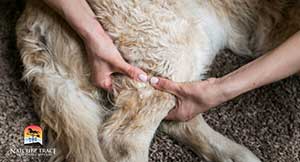 Besides traditional veterinary care, there are alternatives to dog ACL surgery for supporting your canine companions. When faced with a torn ACL, exploring therapies rooted in ancient wisdom and holistic principles opens doors to healing approaches that extend beyond conventional methods.
Besides traditional veterinary care, there are alternatives to dog ACL surgery for supporting your canine companions. When faced with a torn ACL, exploring therapies rooted in ancient wisdom and holistic principles opens doors to healing approaches that extend beyond conventional methods.
In this article, I’ll shed light on alternatives to traditional medicine tailored to aid dogs in coping with a torn ACL. Discover how acupuncture, herbal remedies, and holistic philosophies offer promising avenues for relief and recovery, aiming to restore balance and well-being in our cherished pets.
What Is Alternative/Eastern Medicine for Dogs?
The principles below guide Dr. Smith’s selection of alternative and Eastern medicine therapies.
While these approaches differ from conventional veterinary practices, they aim to provide comprehensive care that encompasses not only the physical but also the mental and emotional aspects of a pet’s well-being.
- Holistic Approach: Alternative and Eastern medicine adopt a holistic view, considering the entirety of the animal rather than isolated symptoms. This approach aims to address the root causes of ailments by focusing on the overall well-being and balance of the body.
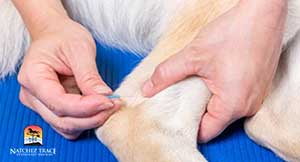 Energy Balance: Eastern medicine, including practices like acupuncture and Traditional Chinese Veterinary Medicine (TCVM), centers around the concept of balancing energy, often referred to as qi (pronounced “chee”). It’s believed that imbalances in this vital life force can lead to health issues, and therapies aim to restore this balance.
Energy Balance: Eastern medicine, including practices like acupuncture and Traditional Chinese Veterinary Medicine (TCVM), centers around the concept of balancing energy, often referred to as qi (pronounced “chee”). It’s believed that imbalances in this vital life force can lead to health issues, and therapies aim to restore this balance.- Natural Healing: These principles often emphasize the body’s innate ability to heal itself given the right conditions. Therapies and remedies aim to support the body’s natural healing processes rather than merely suppressing symptoms.
- Individualized Treatment: Tailoring treatments to the individual animal is essential in alternative and Eastern medicine. Each pet is seen as unique, requiring personalized care based on their specific needs and health conditions.
- Preventive Care: There’s a strong emphasis on preventive measures and maintaining overall health to prevent illness or injury. Dietary adjustments, lifestyle changes, and proactive care are prioritized to prevent health issues from arising.
Alternatives to Dog ACL Surgery
Alternative therapies offer diverse approaches to support dogs coping with a torn ACL, aiming to alleviate discomfort and aid in recovery through non-conventional methods:
- Acupuncture: Utilizing fine needles inserted at specific points on the body, acupuncture seeks to stimulate nerve-rich areas, potentially reducing pain and inflammation associated with a torn ACL. This practice aims to restore energy flow and promote the body’s natural healing mechanisms.
- Herbal Medicine: Herbal remedies may provide natural pain relief and anti-inflammatory effects. Certain herbs, like turmeric or devil’s claw, possess properties that could aid in reducing inflammation and supporting joint health,
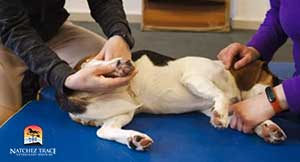 complementing traditional treatments for a torn ACL. Important note, this approach cannot attain full recovery when the ligament has been torn from its entirety.
complementing traditional treatments for a torn ACL. Important note, this approach cannot attain full recovery when the ligament has been torn from its entirety. - Physical Therapies: Alternative physical therapies such as chiropractic care or massage might assist in alleviating muscle tension, improving joint mobility, and enhancing overall comfort for dogs with a torn ACL. These therapies focus on restoring proper alignment and function in the affected area.
Alternatives to dog ACL surgery present unique avenues for managing a torn ACL in dogs. While research on their efficacy specifically for ACL injuries might vary, many pet owners have reported positive outcomes when incorporating these alternative 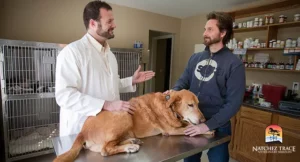 approaches alongside conventional veterinary care.
approaches alongside conventional veterinary care.
Dr. Smith is well-versed in alternative therapies. If you’re hesitant to proceed with ACL surgery or would like a second opinion, we recommend a consult with Dr. Smith. You can meet with Dr. Smith in person or via telemedicine. Dr Smith will help you decide on a treatment plan and ensure your chosen healing methods are safe and conducive to healing your dog’s torn ACL.
Eastern Medicine Principles in Treating Torn ACLs
Eastern medicine principles offer a distinctive perspective in treating torn ACLs in dogs, focusing on holistic approaches that aim to restore balance and promote healing. These principles stem from ancient philosophies and include various modalities rooted in Traditional Chinese Medicine (TCM):
- Holistic Healing: Eastern medicine views the body as an interconnected system, considering the overall well-being rather than solely focusing on the injured ligament. This approach aims to address imbalances within the body that might contribute to the injury.
- Balance of Qi: Central to TCM is the concept of qi, the vital energy believed to flow through the body along specific pathways known as meridians. A torn ACL could be seen as a disruption in the flow of qi. Therapies such as acupuncture
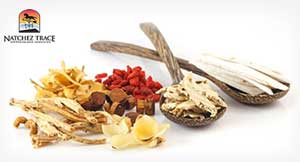 aim to restore this balance by stimulating specific points along the meridians, facilitating healing and alleviating pain.
aim to restore this balance by stimulating specific points along the meridians, facilitating healing and alleviating pain. - Herbal Remedies: Traditional Chinese herbal medicine utilizes a variety of herbs and natural substances to address health issues. In the context of a torn ACL, certain herbs might be recommended to reduce inflammation, promote tissue repair, and alleviate discomfort.
- Dietary Therapy: Eastern medicine often advocates for dietary adjustments to support healing. Specific foods or supplements may be recommended to aid in the recovery process, promoting joint health and overall well-being.
- Restoring Harmony: TCM seeks to restore harmony and balance within the body, not just treating the torn ligament but addressing any underlying imbalances that might have contributed to the injury.
When treating a torn ACL using Eastern medicine principles, a holistic approach is taken, considering the dog’s entire system, including their energy flow, diet, and lifestyle.
These methods aim to not only address the immediate injury but also support the body’s natural healing processes and restore balance for long-term well-being.
Western Approach: Prolotherapy and Surgery
In Western veterinary medicine, the treatment options for a torn ACL often include prolotherapy and surgery:
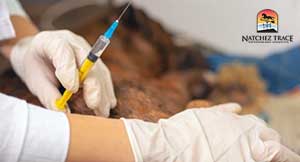 Prolotherapy: Prolotherapy is a non-surgical treatment aimed at stimulating the body’s natural healing processes. It involves injecting a solution, often containing dextrose or other substances, into the injured area, which triggers a localized inflammatory response. This response is thought to strengthen and repair the damaged ligament over time. Prolotherapy aims to promote tissue regeneration and improve stability in the affected joint.
Prolotherapy: Prolotherapy is a non-surgical treatment aimed at stimulating the body’s natural healing processes. It involves injecting a solution, often containing dextrose or other substances, into the injured area, which triggers a localized inflammatory response. This response is thought to strengthen and repair the damaged ligament over time. Prolotherapy aims to promote tissue regeneration and improve stability in the affected joint.- Surgery: Surgical intervention is often recommended, especially for more severe cases of torn ACLs in dogs.
Common surgical procedures include:
TPLO (Tibial Plateau Leveling Osteotomy): TPLO involves cutting and repositioning the bones around the knee joint to alter the mechanics and stabilize the joint without relying on the ACL.
TTA (Tibial Tuberosity Advancement): TTA alters the angle of the knee joint by repositioning the patellar tendon attachment, similarly aiming to reduce stress on the damaged ligament.
Extracapsular Repair: This procedure involves placing a strong suture outside the joint to stabilize the knee while scar tissue forms to support the joint.
These Western treatment approaches aim to address the torn ACL by either promoting natural healing processes (prolotherapy) or surgically altering the joint mechanics to stabilize the knee and reduce strain on the damaged ligament.
Surgery, especially TPLO and TTA, is often recommended for larger dogs or cases where conservative management may not be sufficient to restore adequate function and stability to the joint.
Each approach—prolotherapy and surgery—has its considerations, and the choice between them often depends on factors like the dog’s size, age, activity level, and the severity of the injury. A consultation with Dr. Smith is crucial to determine the most suitable treatment plan tailored to your dog’s needs.
Considerations and Safety
The options encompass a spectrum of approaches rooted in different medical philosophies. Western veterinary medicine presents choices such as prolotherapy, aiming to harness the body’s healing mechanisms, and surgical interventions like TPLO, TTA, or extracapsular repair, focusing on structural stabilization and joint realignment.
On the alternative front, Eastern medicine offers holistic principles, including acupuncture, herbal remedies, and a focus on balancing qi, aiming to restore harmony within the body and promote natural healing.
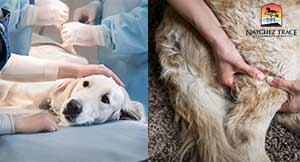 However, Eastern medicine often does not result in full recovery when a ligament has been torn. It does help with pain management and aids in healing inflammation.
However, Eastern medicine often does not result in full recovery when a ligament has been torn. It does help with pain management and aids in healing inflammation.
The path toward managing a torn ACL in dogs is multifaceted, encompassing diverse methodologies, each with its principles and considerations.
The decision between Western approaches, emphasizing intervention or surgical correction, and alternative or Eastern medicine, prioritizing holistic healing and balance, hinges on various factors unique to your dog’s condition, size, and lifestyle.
A consultation with Dr. Smith is paramount in charting the most appropriate treatment course. This collaboration ensures a tailored approach that aligns with your dog’s individual needs, promoting not just recovery but also long-term well-being and comfort.
Schedule your appointment today!
Ultimately, the goal remains consistent: to provide comprehensive care that prioritizes your dog’s comfort, mobility, and overall quality of life.
People Also Ask:
- Can a dog heal from an ACL injury without surgery? Dogs can sometimes heal from an ACL injury without surgery. For some dogs, orthopedic braces and supplements can be successful alternatives to surgical treatment.
- What are the different types of ACL surgery for dogs? There are three types of ACL surgeries for dogs — Lateral suture, tibial plateau leveling osteotomy (TPLO), and tibial tuberosity advancement (TTA) are the different types of surgery available, but not all of them will be a good fit for your dog.
- Are PRP injections a good alternative to ACL surgery for dogs? PRP can be used as a treatment of the injury or to aid in healing following surgical intervention. Additionally, PRP is substantially less expensive than surgery.

